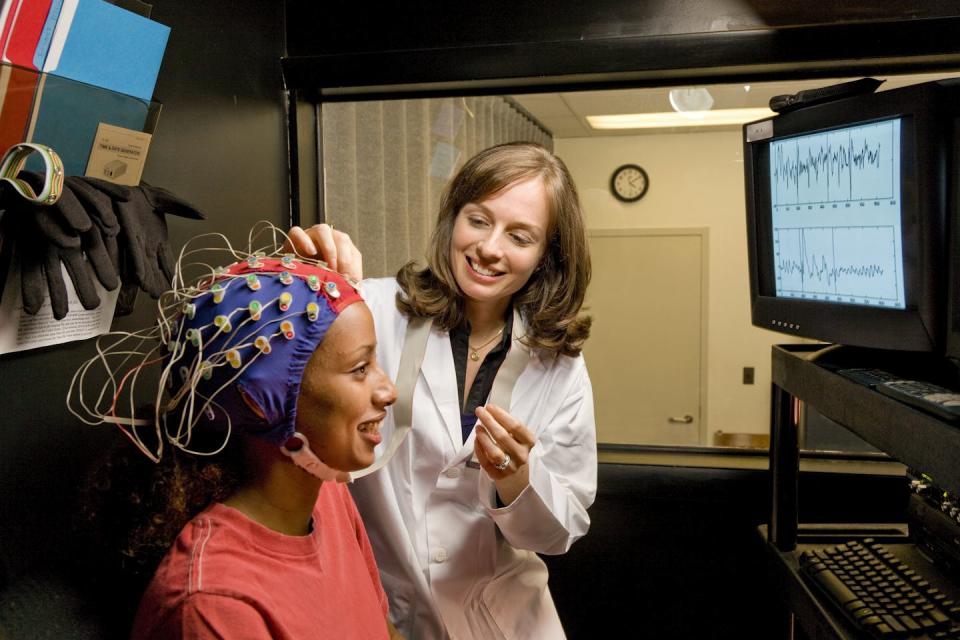
Curious Kids is a series for kids of all ages. If you have a question you’d like an expert to answer, send it to curiouskidsus@theconversation.com.
What happens in your brain when you wake up from sleep? – Ainsley V., age 11, South Carolina
When you are asleep, you may appear completely dead to the world. But when you wake up, you can suddenly get up and take action. How does the brain open up awareness or consciousness? This question has puzzled scientists for centuries and continues to puzzle them.
Although scientists don’t yet have the full answer to this question, they are gaining clues by studying people’s transitions between sleep and wakefulness.
Looking inside a living brain
One way scientists study brain activity is with a tool called electroencephalography, or EEG. An EEG measures electrical signals from thousands of brain cells called neurons. The person being examined wears a funny-looking hat that’s connected to a computer. It doesn’t hurt at all. The electrical activity in their brain looks like wavy lines.


You may think your brain is off or resting while you sleep, but it’s actually on a roller coaster of activity without you even realizing it. You go through four different sleep stages, each of which shows up as a different pattern on the EEG.
One stage of sleep is called rapid eye movement or REM sleep, and dreams usually occur during this stage. Dreams are interesting because you actually feel like you are conscious, but you are not as conscious as you are when you are awake.
It turns out that each sleep stage is also associated with different chemical patterns in your brain. These are called neurochemicals and are the way brain cells communicate with each other.
What scientists know so far
One of the main systems in your brain that wakes you up is called the reticular activating system, or RAS. The RAS is a part of your brain located just above your spine. It’s about two inches long and about the width of a pencil. The RAS acts like a gatekeeper or filter for your brain, ensuring it doesn’t have to deal with more information than it can process.
The RAS can perceive important information and create neurochemicals that wake up other parts of the brain and keep you awake throughout the day.
If you need to go to the bathroom in the middle of the night, the RAS detects this signal from your body and flicks a switch to wake up your brain—like a light switch. Signals from outside your body, such as the sound of an alarm clock or a parent waking you up, can also turn on your RAS.
When the RAS switch is turned on, it can take a while for your entire brain and body to wake up. This is because it takes a few minutes for all the “sleepy” neurochemicals in your brain to clear, which is why you may feel groggy when an alarm clock wakes you up.


So why do you feel groggy some days and not others? Your brain cycles between deep and light sleep stages. If your alarm goes off during a deeper sleep stage, it takes longer for all parts of your brain to wake up. Using technology, you can track which stage of sleep you’re in and then wake up in the light stage, so you wake up feeling more refreshed.
Mysteries waiting to be solved
There’s still a lot to learn about waking. Despite spending about a third of your time sleeping, scientists don’t fully understand the purpose of sleep.
They know that sleep is vital to health, especially for children, whose brains and bodies are still growing. Sleep helps restore your immune system, improves your memory, and supports your mental health. And you might be surprised at how many hours of sleep doctors recommend for babies, children, and adults.
While scientists have found some of the pieces, the puzzle of how and why the brain generates consciousness remains unsolved. That’s why the future needs curious scientists — maybe even you.
Hello, curious kids! Have a question you’d like an expert to answer? Ask an adult to send your question to CuriousKidsUS@theconversation.com. Please tell us your name, age, and city.
And since curiosity has no age limit – adults, let us know what you’re curious about. We won’t be able to answer every question, but we’ll do our best.
This article is republished from The Conversation, a nonprofit, independent news organization that brings you facts and trusted analysis to help you understand our complex world. By Hilary A. Marusak Wayne State University and Aneesh Hehr, Wayne State University
Read more:
Dr. Marusak’s work is funded in part by grants from the National Institute of Mental Health.
Aneesh Hehr does not work for, consult, own shares in, or receive funding from any company or organization that would benefit from this article, and has disclosed no affiliations beyond his academic appointment.